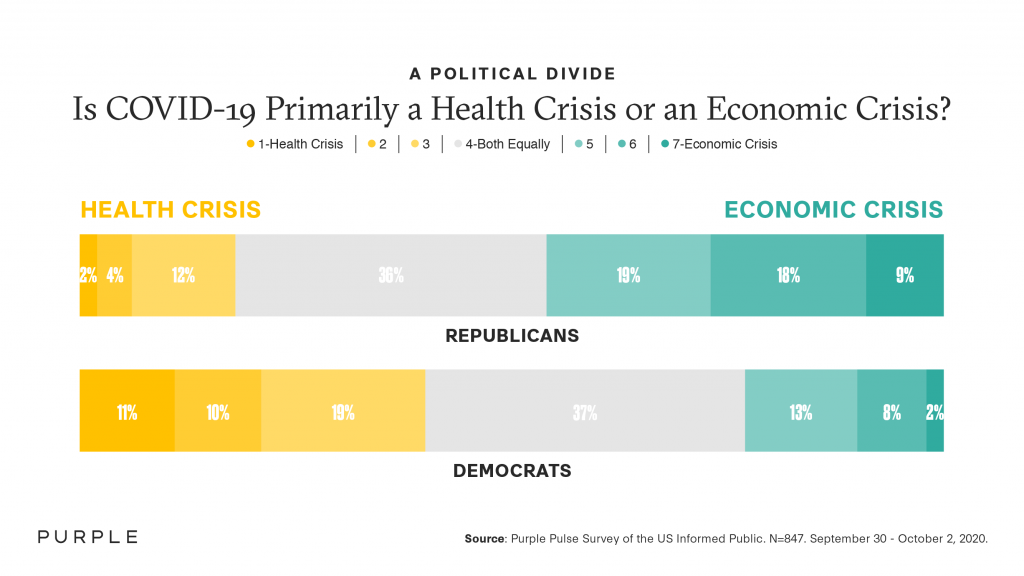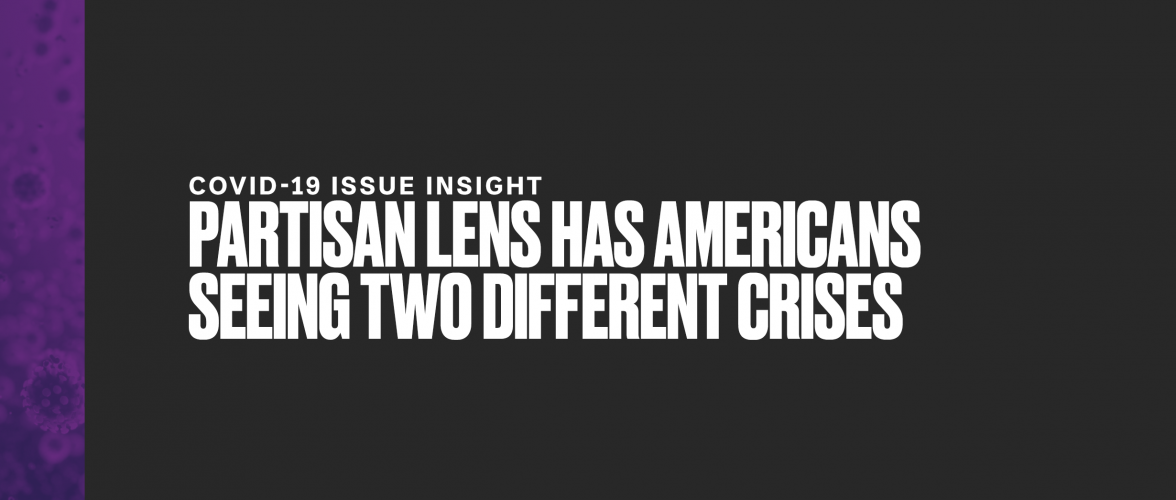COVID-19 Issue Insight Series | View as a PDF
Who it impacts
Companies and businesses of all sizes and sectors | Corporate leaders across the political spectrum | Anyone responsible for business planning or corporate decision-making during this phase of the pandemic

What we see
• Partisanship shapes your view of the crisis: Health v. Economic. Republicans view COVID-19 primarily as an economic crisis and believe re-opening should be a top priority. In contrast, Democrats view COVID-19 primarily as a health crisis and believe caution should be the guiding force, even if it is costly to the economy.
• Expectations are high and bipartisan for businesses to enforce safety guidelines. Regardless of party, the majority say they will stop shopping at places that don’t enforce health and safety guidelines (64% overall, 80% among Democrats, 57% among GOP). And, the majority would feel more favorable toward companies that choose to shut down in the face of rising COVID-19 cases.
Republican sentiment surrounding those safety expectations, however, is complex. Republicans are almost twice as likely as Democrats to report feeling frustrated with businesses that choose to close when they are not mandated to do so, even as the majority acknowledge an expectation that companies enforce safety guidelines (57%) and say they would feel more favorable toward a company that closes in the face of increasing COVID cases (53%). One in two Republicans (48%) say they would be frustrated if businesses choose to close if state/local guidance allowed them to be open, compared to only around 1 in 4 Democrats (28%).
• How businesses approach re-opening impacts company reputation for the long-term. Regardless of party, 60% agree that how a company handles its re-opening will have long-standing ramifications for how the public thinks about it.
What it means
Americans’ political attitudes are the filter applied to all areas of life, and the pandemic is no exception. The public is subconsciously judging companies’ opening and closing decisions through their own partisan value system and lenses. Differences such as Republicans’ increased frustration with companies “choosing” to close, or Democrats’ feeling less inclined to agree that corporate America is playing a leading role in protecting public health, are manifestations of the partisan divide on the central question of whether the pandemic is an economic crisis or a health crisis. These divisions are real and don’t just involve fringe partisans or ideologues.
Decision-makers need to be aware that their customers and stakeholders are likely to interpret how a business weighs safety considerations and economic realities as cues about whether that business leans in or out of their ideology. Attention to these cues will be critical in striking the right tone for making and communicating decisions about every phase of re-opening, including potential re-closings as the pandemic continues to unfold. A business’s actions have the potential to do damage or pay dividends today and in the future: the majority say they will stop shopping at businesses that don’t enforce health and safety guidelines and agree that how a company acts now will have long-standing ramifications for how they think about that company.
What you should do about it
• Step out of your own political bubble. Regardless of your organization’s culture or how you feel as a business executive or decision-maker, remember that the other side is out there and looking to see how you are handling these sensitive issues. Critics are likely to come from both sides: Republicans will complain about businesses closing if they can be open and Democrats will balk if they see lax enforcement of safety guidelines. Don’t decide based on fear or backlash – but out of respect for the seriousness of the situation
• Pair Health and Economic factors together in your re-opening plans. It is critical to emphasize how your re-opening plans respect health and safety guidelines and how they support the economy. Reframing to include both health and economic factors in tandem will allow your plans to reach audiences on both sides of the partisan divide.
• Communicate as more than a “check-the-box” exercise. Communicate and then re-communicate not just decisions but the rationale and considerations driving them: What is driving decisions to re-open or to close? How are you protecting the health and safety of employees and customers? When and why are you making changes? Plan to communicate as often as necessary to keep pace with the constantly evolving situation in your area. Spend the time to show how your business plans demonstrate responsibility for health and how plans are aligned with local guidance and permissions. For most of the population, enforcing guidelines respectfully will pay dividends – but framing will help to protect against objectors trying to politicize your business’s decisions.
Purple Pulse Survey of the US Informed Public. N=847. September 30-October 2, 2020.
Purple Pulse Survey of the US Informed Public. N=1,000. July 17-22, 2020.
Purple is actively partnering with companies and industries to navigate the ever-changing COVID-19 pandemic and prepare for the future that will come after, bringing deep experience helping the world’s best-known companies navigate the world’s toughest challenges. Please reach out to author Sarah Simmons or any member of our Purple team to let us know how we can support you.
By Sarah Simmons | Managing Director | sarah.simmons@purplestrategies.com

 What does corporate leadership look like in a divided nation?
What does corporate leadership look like in a divided nation?  Waiting to Engage in D.C. Is the Most Expensive Mistake You’...
Waiting to Engage in D.C. Is the Most Expensive Mistake You’...  The Era of High-Stakes Uncertainty
The Era of High-Stakes Uncertainty  What Forces are Shaping the Future for CMOs?
What Forces are Shaping the Future for CMOs?